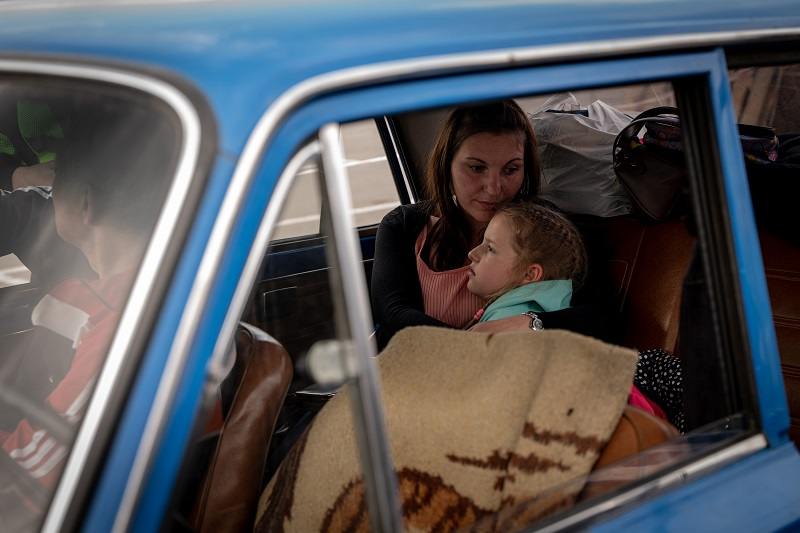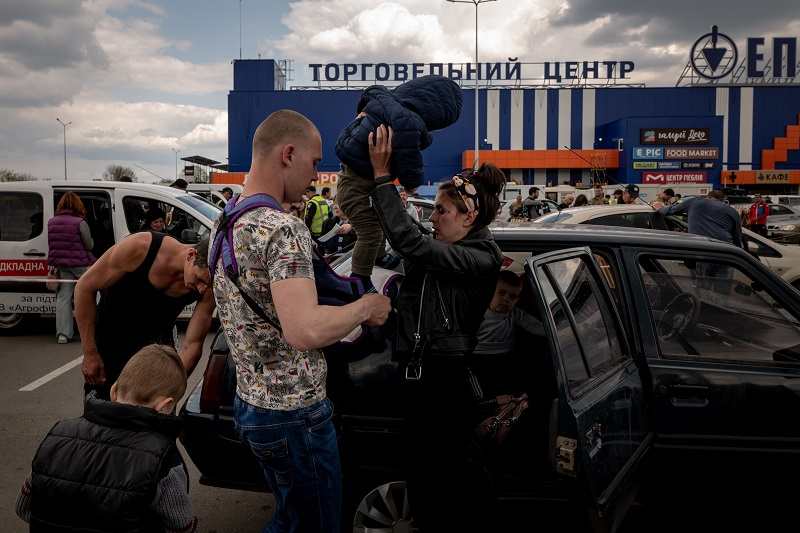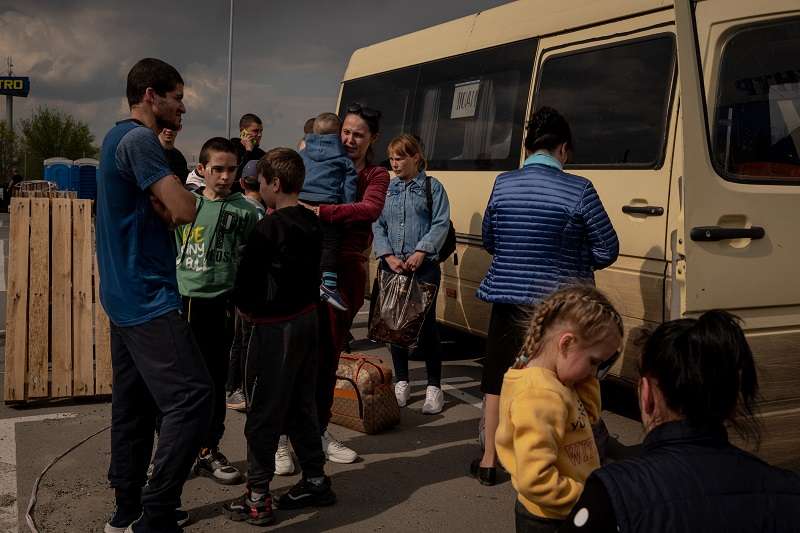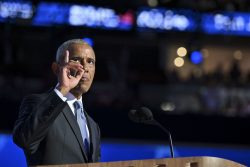
A family fleeing Russian-occupied Tokmak, Ukraine, is registered at a reception center in Zaporizhzhia, where a steady stream of vehicles carrying displaced civilians arrived Monday.
12:46 JST, May 3, 2022
Moscow is preparing to annex vast new swaths of Ukrainian territory in coming days, the United States said on Monday, potentially moving to cement control of much of the country’s east even as Russian forces struggle to capture key areas on the battlefield.
A move by the Kremlin to formally claim as part of Russia the eastern Ukrainian regions of Donetsk and Luhansk, along with the southern city of Kherson, amid an intense ongoing military battle could thrust the conflict into an unpredictable, even more explosive phase.
It is not clear how Ukrainian forces and their allies would respond to such an attempt, which would echo the annexation of Ukraine’s Crimean Peninsula in 2014 but, in a crucial difference, occur as forces loyal to Ukraine fight to retain control of their territory.
A senior U.S. official said “highly credible” intelligence indicates that Russia will probably stage fraudulent referendums in mid-May in which citizens of Donetsk, Luhansk or Kherson appear to express support for leaving Ukraine and becoming part of Russia. After that, Russia would probably install leaders loyal to Moscow in those areas.
The votes would be an attempt to give the planned annexations a “veneer of democratic or electoral legitimacy,” Michael Carpenter, the U.S. ambassador to the Organization for Security and Cooperation in Europe, told reporters at the State Department. He called the move “straight out of the Kremlin’s playbook” but declined to disclose the intelligence underlying the U.S. prediction.
Russia had no immediate response to the allegations.
Carpenter said the U.S. intelligence community’s track record on predicting Russia’s invasion of Ukraine should give the public confidence in its current assessments. “Unfortunately, we have been more right than wrong in exposing what we believe may be coming next,” Carpenter said. He also noted that the Russian plan may not succeed.
Moscow recognized the separatist Donetsk and Luhansk regions as independent of Kyiv, the Ukrainian capital, just before launching the invasion on Feb. 24, sending Russian forces into those regions for “peacekeeping” purposes. In Kherson, the first major city captured by Russian forces, the Kremlin appears to be laying the groundwork for formally cementing its control, announcing a transition to Russian currency and – according to Britain’s Defense Ministry – preparing to install a puppet local government.
Daniel Fried, a former U.S. ambassador to Poland who is a fellow at the Atlantic Council, said Russian President Vladimir Putin might be hoping that Europeans would tolerate annexation as a way to end the bloody conflict. But he said apparent Russian atrocities – such as in the town of Bucha, where civilians appeared to have been tortured and beheaded – would make a peace offensive based on annexation more difficult for Ukraine’s Western backers to accept.
This plan works if he’s won, Fried said of Putin. “The trouble is that Putin may claim territory not on the basis of having beaten the Ukrainians but on the basis of an extravagant claim he can’t support.”
Western officials describe a Russian military under strain nine weeks into its offensive but still able to pound strategic areas of southern Ukraine, including the coastal city of Mariupol, where heavy bombardment has left many civilians unable to reach safety.
A U.S. defense official, speaking to reporters on the condition of anonymity under Biden administration rules, said Russian troops were making “minimal progress at best” in their attempt to seize the Donbas region.
In some cases, quite frankly, the best way to describe it would be anemic, the official said. Russian forces had withdrawn in many instances following their capture of a city or town, allowing Ukrainian forces to recapture the area, the official said, adding that Russian forces were now launching offensive operations around Izyum, a city in eastern Ukraine that Russian forces first captured in March.
Britain’s Defense Ministry said that more than a quarter of Russian units sent to Ukraine had been damaged to the point where they were probably “combat ineffective.” The ministry said it could take years for Russia to reconstitute elite units weakened in the war.
Taken together with an accelerating flow of Western weaponry for Ukrainian forces, the reports of logistics challenges and battlefield reversals suggest a taxing road ahead for Russia as it approaches its traditional May 9 Victory Day celebration. Analysts have suggested the date may present Putin an opportunity to offer his view of Russia’s war achievements to the Russian public.

A family from Dniprorudne in Zaporizhzhia, which is Russian-occupied, shortly after arriving at a reception center for internally displaced people on Monday.
The U.S. defense official said that Russia’s top military officer, Gen. Valery Gerasimov, visited the Donbas region last week, but the Pentagon has not been able to confirm whether Gerasimov was wounded, as some media reports have suggested.
Russia’s Defense Ministry, in an update on Telegram, meanwhile reported that Russian forces had wiped out a wide array of Ukrainian weaponry, including arms depots, drones, rocket launchers and anti-air systems.
Even as the fight for control of Donbas regions unfolds in slow motion, intense Russian attacks have continued on Mariupol, where civilians have been trapped by a punishing weeks-long siege. The strategic port city, if captured, would provide Moscow a land bridge from Russian territory to Crimea.
Mykhailo Vershynin, head of the Donetsk regional patrol police, said that some 200 civilians, including about 20 children, remained trapped in the Azovstal steel plant in Mariupol, where civilians and fighters have taken shelter in underground areas. About 100 noncombatants were reported to have been evacuated from the vast complex over the weekend.
Vershynin said that he hoped civilians, those wounded and, possibly, fighters could be extracted from the plant if an agreement between Russia and Ukraine could be reached.
If not, he said, “Russia just levels completely from the face of the earth everything that’s left at the factory. This won’t be easy, because one way or another we’ll defend to the last fighter.”
There will be losses for Russia. It will lose its shaky authority completely, Vershynin said. “And we’ll be destroyed. . . . It’s that kind of story.”
A new Washington Post-ABC News poll showed that a bipartisan majority of Americans back greater sanctions on Russia and that most support humanitarian and military aid to Russia, but most of those polled oppose direct U.S. military action against Russia.
The Israeli government meanwhile responded with outrage to remarks by Russian Foreign Minister Sergei Lavrov accusing Ukrainian President Volodymyr Zelensky, who is Jewish, of backing Nazism and suggesting that “Hitler also had Jewish blood.”
Israeli Foreign Minister Yair Lapid said that Russia’s ambassador to Israel would be summoned over Lavrov’s comments, which he called “both unforgivable and outrageous.”
Prime Minister Naftali Bennett said the Russian official’s words “are untrue and their intentions are wrong.”
As Ukrainian and Western officials call for greater organized evacuation of civilians from hard-hit areas of Ukraine, a steady stream of vehicles carrying civilians arrived Monday in the eastern town of Zaporizhzhia, a destination for those seeking safety from across the region’s front lines and Russian-occupied territories.

Families assemble to register at a reception center in Zaporizhzhia, Ukraine, on Monday, shortly after arriving from Russian-occupied Tokmak, in Zaporizhzhia Oblast.
Most arrived in private cars with the word “children” scribbled on the windshield in Russian. The passengers inside were exhausted.
Once-simple journeys had taken hours, or even days, as Russian soldiers searched the families’ cellphones and personal belongings at each of the several dozen checkpoints. Some said they had spent nights in their cars, on the road, in fields or in churches.
After weeks of failed attempts to leave the town of Enerhodar, one young couple said that they awoke Monday to find their cellphones flush with messages. The road to Zaporizhzhia had opened up.
We just jumped in the car, said Yuri, who, like many civilians interviewed at the evacuation point, asked that his surname be withheld amid security concerns for family members still in Russian-held territory.
He said that he and his girlfriend, Victoria, had visited her parents days before the invasion, planning on a short stay. When war engulfed the city, they found themselves trapped. The occupation that followed felt like “terror,” he said.
The couple had tested the route Monday to convince Victoria’s family that it was safe. By the time they arrived in Zaporizhzhia, Yuri was fighting back tears. On the phone to her mother, Victoria was crying, too. “We’re safe, Mama,” she told her. “We’re safe.”
Top Articles in News Services
-

Prudential Life Expected to Face Inspection over Fraud
-

Hong Kong Ex-Publisher Jimmy Lai’s Sentence Raises International Outcry as China Defends It
-

Japan’s Nikkei Stock Average Touches 58,000 as Yen, Jgbs Rally on Election Fallout (UPDATE 1)
-

Trump Names Former Federal Reserve Governor Warsh as the Next Fed Chair, Replacing Powell
-

Suzuki Overtakes Nissan as Japan’s Third‑Largest Automaker in 2025
JN ACCESS RANKING
-

Japan Institute to Use Domestic Commercial Optical Lattice Clock to Set Japan Standard Time
-

Israeli Ambassador to Japan Speaks about Japan’s Role in the Reconstruction of Gaza
-

Man Infected with Measles May Have Come in Contact with Many People in Tokyo, Went to Store, Restaurant Around When Symptoms Emerged
-

Prudential Life Insurance Plans to Fully Compensate for Damages Caused by Fraudulent Actions Without Waiting for Third-Party Committee Review
-

Woman with Measles Visited Hospital in Tokyo Multiple Times Before Being Diagnosed with Disease

























